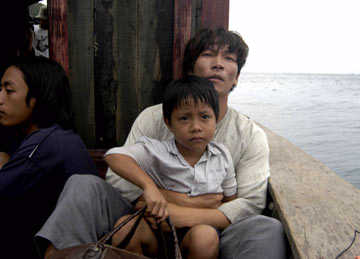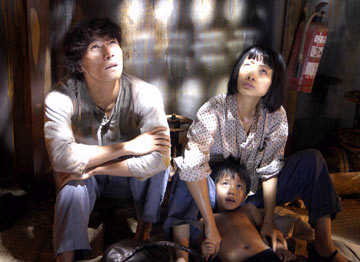

One of the facets of the Vietnam War not explored in depth in cinema is the children of American GIs. These children were orphans in many senses. Their fathers were either dead or halfway across the world. They were not welcome in their own home country, and were outcasted and despised. The Beautiful Country is the story about one of these children, Binh (Damien Nguyen), an easy target because he is so tall and looks American. Because of his social status and lack of family, Binh is half a person. When he finally learns that his mother is alive and in Saigon, he decides to leave, thus embarking on a journey that will take him halfway around the world.
The Beautiful Country is Binh's search for family and identity. Once in Saigon, he discovers he has a young brother, Tam (Dang Quoc Thinh Tran), and life is decent for a while. Eventually the two decide to make the harrowing trip to America to find Binh's father. Along the way, he meets Ling (Bai Ling, Lords of Dogtown, Face), a Chinese woman incarcerated at a Malaysian detention camp. There are further stops in New York, where the characters deal with conditions amounting to human slavery. But The Beautiful Country is not necessarily about plot, it is about the experiences of Binh, and the personal journey he needs to take. Heck, the largest name trumpeted on all of the advertising is Nick Nolte (Hotel Rwanda, Hulk), and after some time in the movie passes, it's pretty easy to guess who he is.
The screenplay was written Sabina Murray, herself half-Asian and half-American, based on a story by herself and Lingard Jervey (Undertow). And it certainly feels like there is a personal element mixed into the fold. Nguyen has a quiet presence, probably from years of verbal and mental abuse. Still, he believes that if he finds his parents, he can come to a better understanding about himself, and this determination drives him forward for duration of the film. Unfortunately, the rest of the characters are not as deep as Binh are. Aside from Nolte, they are pretty much there to serve a brief purpose (the slave ship owner, the leader in the camp, the domineering boss), then disappear quietly. The final scenes of the film are the best, handled effectively by Director Hans Peter Moland (United We Stand, Aberdeen). For a highly unlikely comparison, take Kill Bill Vol. 2. For the entirety of both movies, there is a certain image associated with the unseen character. Yet, the eventual meeting that happens is very different.
The Beautiful Country does a decent job showing the awful conditions of the Malaysian camp and of the ship that Binh takes to America, but The Beautiful Country suffers a bit from being too long. The Beautiful Country is a bit too long, and contains many unnecessary sequences including a short romance between Binh and Ling, and stretching out others. One gets the feeling that the filmmakers tried to thrown in as much as possible in order to show the emotional journey that Binh undergoes, but it was a bit too much.